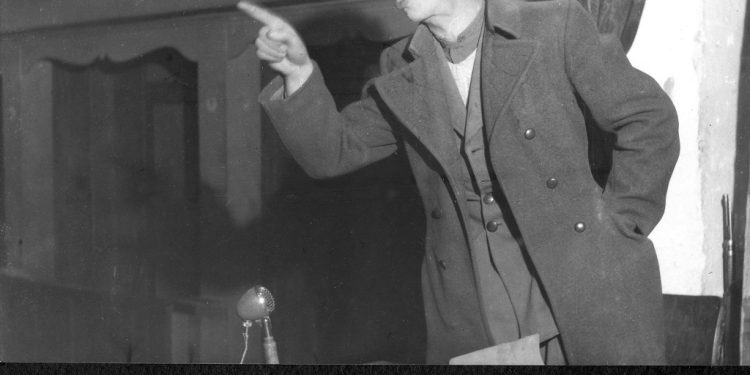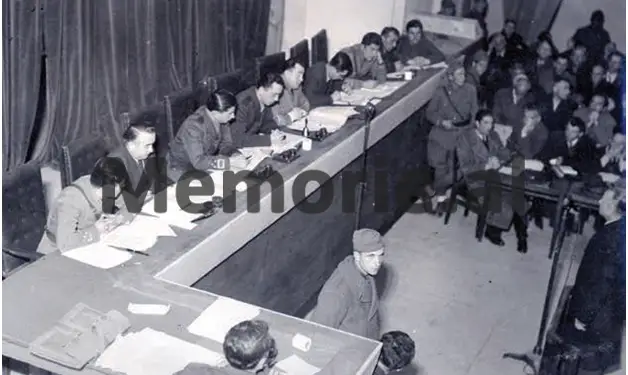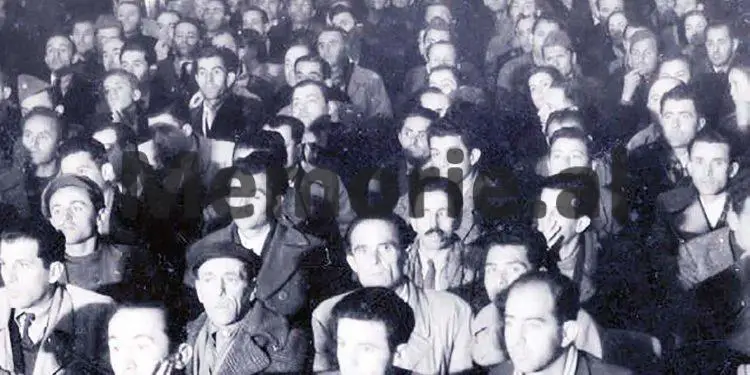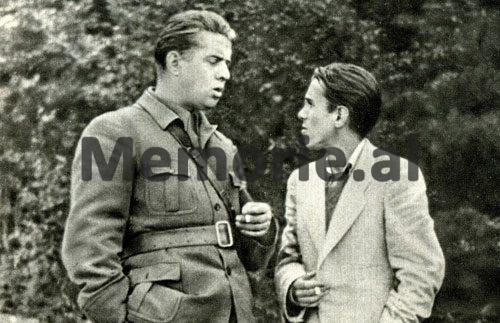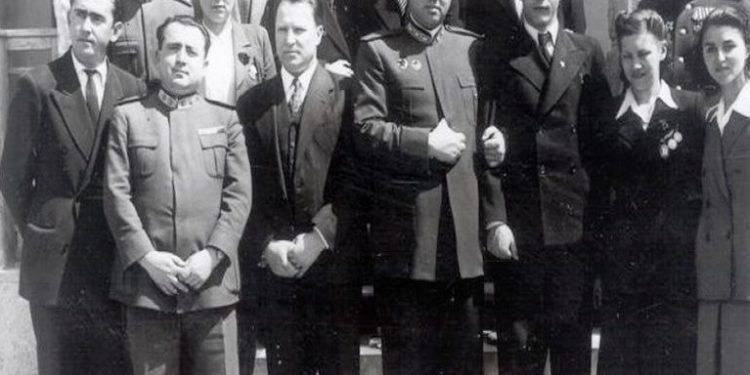By Franco Benanti
The fifth part
Memorie.al / The Second World War had a powerful impact on Albanian lands as well. Much has been said about this by our historians, in the communist spirit. The generations before 1990, have learned this from textbooks, from the History of the Labor Party and the History of Albania, but very few eyes have been familiar with the alternative treatment made by non-communist historians and authors, inside and outside the country. In this regard, the book “La guerra piu lunga” by Franco Benanti, a former doctor in the Italian occupying army, in the Balkans and Albania, published by the house “Mursia” in Milan, is of great interest (first edition in 1966, followed by four reprints later).
Continues from the previous issue
When they escorted me to the cell, they deliberately passed me past some other prisoners, who had beaten them up and made them bloody, so that I could understand that the same fate could befall me. After two weeks, the judge introduced me to the charge: espionage in favor of the Vatican and connection with the internal reaction. For Albanian justice, the issue of innocent or guilty did not matter.
Temporarily innocent, it means not yet arrested, guilty, if they put you in prison…! They asked me to show the names of collaborators, which for me did not exist. They locked me in a darker cell, with more humidity, with a wet floor, with only bread and water. Two days and two nights like that.
Shooting simulation
After they did not succeed in this way, they used the extreme measure: the simulation of the shooting. They woke me up at 2 o’clock in the morning and immediately sent me to the judge.
– “You will not speak; you will not show your hostile activity against our government? I have here the order to shoot you. Did you understand? Instantly! We have evidence that you are a Vatican spy. Read it! I felt my blood move rapidly.
– “I am sure that these testimonies are untrue” – I objected. – “If these witnesses exist, why don’t you confront me with them”?!
– “We don’t have time to discuss anymore. If you don’t immediately give me the names we’re looking for, you’ll be put in front of the firing squad”!
I examined in those moments the situation I was in. In these moments that could be the last in my life, the brain began to work at an accelerated pace.
– “You have three minutes to think” – ordered the judge.
Three minutes passed and I had nothing to say.
– “Then enough – said the judge – you will see that we are not joking”.
Several armed soldiers entered the room. They tied my hands and took me outside, to the prison yard. A car was waiting for us there. Along with the judge, there were also three other officers. The car started immediately. It was maybe 3 o’clock in the night, when the city was deserted. After a few minutes, we stopped in front of the cemetery wall.
We went down, walked twenty steps to the foot of the wall. They supported me with my shoulders against the wall. The soldiers lined up in front of me, about 15 m. away. Several minutes passed in grave silence. In my mind flashed everything I had ever loved, everything I had to leave behind forever. I remembered my youth, my wife, and my children.
– “For the last time, I invite you to speak. It is enough to tell us some names and everything will be solved”.
– “I’m sorry, but I don’t have any names to tell you, I don’t know the names you want. Have you not understood, after so many sessions in the investigator, that I am innocent”?
At this moment, what I didn’t expect happened, the whole scene changed. The judge approached me, took my hand and shook it, saying:
– “Now I believe you, but we had to make sure until the end, that you didn’t have anything important to tell us”!
The comedy is over. They put us back in the car and took us back to prison. The judge gave me a friendly smile. They returned me to the cell, where I fell into a peaceful sleep full of hope. In the morning I was told that I could be released quickly, a matter of hours. In the meantime I was sent to take a warm shower and given me washed sheets. I looked forward to touching freedom.
The ordeal of torment continues
But the next day, the judge called me and informed me that his superiors had ordered him to send me to Gjirokastër, where the local police knew me better. Nothing could be done without the approval of Security above! Two policemen escorted me to a prison car, filled with sacks of flour. Apparently, one road and two jobs, together with me they would also transport food to the distant district. In Gjirokastër, the car stopped in front of the church, which had turned into a prison. They had removed almost everything from there. I was met by a captain of the military police, whom I met at the end of the war, Omer Osmani.
He received me with a certain cynical politeness.
– “Good afternoon! I’m sorry; the owners of the house are not. Like all spies, we sent them to their country”.
Then he ordered a guard:
– “Enter room number nine”!
In that room I found another guest. We sat for a long time and no one started talking. It was clear, we were afraid that betrayals in the cell were something common. After a few days, I was transferred to another room, with 12 people. As I later found out, these transfers were made in accordance with a police strategy, according to the science learned from the Yugoslavs and the Soviets. Nesti Papajorgjin, whom I met in this church, a long time ago, was brought to us bound hand and foot. Eight policemen were beating him, cursing him: “Get kid, son of priests, grandson of the Pope”!
A day later, he was sent to the prison of the Gjirokastra castle. Little by little, I learned from my roommates their stories: arbitrary arrests, torture, and perjury, convictions without trial or, trials without any guarantee of protection. Many were sentenced to death, others to forced labor. One night, around the middle of June, Osmani calls me and asks me to tell him my biography. If communism is a kind of religion, this matter of biography is one of its rites.
– “What did you talk about with the priests of the Mission”?
– “I don’t remember what I discussed, but I’m sure nothing bad.”
– “Didn’t you tell them that we communists destroyed freedom”?
– “No, no, I didn’t tell them that.”
He handed me a letter of declaration, signed by two informants, testifying that I had said those words.
– “Don’t you want to deny this too?! We know very well that you are an agent of the Vatican, you are also a spy for the English”!
– “You are fantasizing, it seems to me” – I told him. – “I met that English gentleman because he was sick. After visiting him, I gave him a letter about my family in Italy, as he would be traveling in those days. I’m not a spy. What you say is crazy” – I remarked.
– “What did you say, madness”? Here is the hotel waiter’s statement. It’s better to plead guilty and you will receive a lesser sentence.”
They continued to interrogate me every night. No matter how much I tried to convince them that I am innocent, it was useless. They threatened me, that they would beat me. Finally, one night they gave me a letter, where I had to sign for the conversations.
– “What is written here is not true – I told them. Confront me with the witnesses.”
The next night they brought me Nesti Papajorgjn. He was held by the arms of two policemen, from whom he had fainted profusely, from the torture.
– “Is it true that the doctor received books that propagandize against the government from the priests”?
– “No, I did not say this. I said he took religious books to read. The doctor did nothing wrong. I can’t testify to something that he didn’t do,” continued Nesti, even though Osman hit him on the neck hard, threatening him. The days that followed, Osman kept me in the office, questioning me from nine o’clock to six o’clock, hoping to get something out. Apparently, this is what the superiors in Tirana had ordered. He went to Tirana and when he came back he told me: take this letter, write whatever you want, but be honest and sign it.
After a few days, I was transferred to the castle prison. This had been rebuilt by Ali Pasha of Tepelena. There were several long corridors and labyrinths, like a tower of Babel. In the rooms that could hold 10 people, they had entered 30 people. The air was polluted by tobacco smoke, and people’s breaths. Most of those I saw there looked sick, emaciated, disfigured by what they removed every day. It was a good thing that they let us out for half an hour a day, to breathe the fresh air in the yard. I was a guest in that castle until the 12th of August.
I cannot describe all the painful scenes that were repeated every day there. Among the prisoners, there were former members of the Ballista and Legality parties, enemies of the communists, so-called saboteurs or saboteurs, opponents of collectivization in agriculture. They also brought communists, who were accused of lowering the revolutionary outlook, there were also Greek minorities.
Farces of communist trials
In the first week of August, we were brought before the court. The night before, one of us lost his mind and started barking like a dog. They came and took it and we never saw it again. The trial took place behind closed doors. The public was the military and military police officials. At first they called a war criminal.
– “He accepts the guilt”?
– “No, I don’t accept it”!
– “It doesn’t matter, all the evidence speaks against you.”
– “But the evidence is false and my depositions were obtained through torture.”
– “Calm down, answer only when we ask you.”
Then, the prosecutor gave the sentence: death! This was also approved by the court. Thus, within 15 minutes, the court sentenced a man to death, without the right of appeal. They continued with another one who was sentenced to forced labor. It was my turn. I was accused of espionage and connections with the Vatican and reactionary propaganda.
– “Accused, do you have something to say, why are you being accused”?
After realizing that the decision for me had already been made, I said:
– “Thank you for giving me your word. This trial ignores the universal elements that cannot be absent in any process. No witness has been questioned, no written testimony has been presented to us, the words that have been said have not been proven, and the accusations are like fictions of someone’s imagination. You call this a trial?! I have nothing to say. They called me a man without respect for the court, said they are convinced of my guilt and sentenced me to one year of forced labor.
The comedy continues
After I had already spent a year in prison, the order came to release me immediately. But they did not return the things they had taken from me when I was arrested. They ignored my protest. I went to the house where I had stayed before. The lady of the house looked at me with fear, like a prisoner. I fell asleep immediately. When I woke up, I had a surprise. Omar Osmani had come to pay me a visit. He had brought with him several packages of food, meat, ham, preserves, sausages, boxes of marmalade and chocolates.
– “They are a gift for you,” he told me. – You have to eat to recover yourself”.
Apparently, this was what he had been instructed to do from above. I had to recover as soon as possible, so that I could work. After the captain had left, I had another visit, from a girl, less than twenty years of age, who invited me to an evening of entertainment.
– “You have to know the good side of Albanians – she suggested. – Come dance this evening with us. Forget the bad memories”!
I sat for two weeks, doing nothing. The authorities had given me some time for rest and relaxation. However, the military police took care of my re-education. They brought me propaganda materials; they were ready to marry me to an Albanian girl! I was invited to many political conferences.
Back to work
In the last days of August, the order came to move to Tirana, near the Xhenjo Brigade. There I found out about the shooting of prof. Lozzi and for the fact that many Italians were in prisons. The commander was a geg, ex-fighter in Spain, married to a French woman. I took a seat in the officers’ hotel. The newspapers spoke at that time, against the Western Powers, who had not allowed Albania to participate in the talks on Italy’s war reparations. There was talk about the incidents on the Albanian-Greek border.
On May 15, Albania’s naval batteries had sunk two British ships in the Otranto Channel and continued military aid to the Greek partisans. The Yugoslavs had signed a friendship and military treaty with Albania, which obliged them to defend the small country in case of aggression from Greece. Many economic and cultural agreements were also signed. At the beginning of 1947, the factional war within the Communist Party intensified, between the Hoxha-Spiru group and the Philo-Titists; Xoxe-Pandi Kristo.
During those 14 months that I spent in Tirana, I got to know the political situation of the country well. The regime rested on three pillars: the Party, the police and the army. The socialism advertised by the communists, as equality between citizens, denied all the rights of the individual. It was a dictatorship over the proletariat in the country, to be a dictatorship of the proletariat. The basis of the regime was not the workers and peasants, but the high party leaders, the State Security officials, the party apparatchiks and the leaders of the economy. This block constituted the skeletal system of the regime.
To make changes, the regime relied on violence. The police and the army did what the time had to do, to socialize the Albanian people. Forced labor involved many sectors of industry. The citizen of the new Albania lived to produce; the main goal was to increase production. The notion of human rights was not legal, but political. The secret political police, (State Security), always hatched conspiracies to eliminate the old leadership and help the party dome in the struggle for power. The unanimity of the popular consensus had its origins only in terror. Enver Hoxha’s regime was not supported by the enthusiasm of the people, but by the means of violence.
The people had to make many sacrifices. Thousands of kulaks, small landowners, were massacred. The level of measures was very low, compared to that of party and state functionaries. Thus, the salary was 4,000 ALL for an unqualified worker and 50,000 ALL for officials. For comparison, a pair of shoes cost 2,000 ALL, while a watch cost 30,000 ALL. Everywhere there were slogans, emulation boards, propaganda tools. Several apartments were built for the functionaries and high-ranking military, in addition to expropriating thousands of house owners, to house the regime’s officers and employees.
The day of freedom was approaching
On October 20, 1947, the Xhenjo Brigade was transferred to Shkodër. All materials for bridges, walkways, etc., came from Yugoslavia. The brigade received the tools, instructions, manuals, etc., from the Yugoslavs. This was the tribute that Hoxha paid to the Yugoslavs, for aid. In Korça, the Yugoslavs built a sugar factory, in Elbasan, a marmalade factory, in Tirana, an automatic telephone exchange.
But according to Nako Spirut, these aids were few and the country was impoverishing. The Koçi Xoxes faction was against him; as a result, Nako Spiru was forced to kill himself in November 1947. After that, Soviet-Yugoslav relations began to deteriorate. But in January 1948, Stalin invited Gjilas to Moscow and said:
– “We agree that Yugoslavia will swallow Albania.” We prefer the proletarian Koçi to the intellectual Hoxha”.
On the other hand, Stalin secretly encouraged Hoxha against the Xoxes and the Yugoslavs. When Tito sought to send two Yugoslav divisions into Albania to defend it against possible Greek aggression, Stalin denounced him to the Comintern. In March 1948, the General Staff of the Army decided to build a road from Berat to the border with Greece. This was done for an eventual match with Greece. Our brigade was transferred there, to Vërtop.
Here I had the opportunity to escape from this place forever. At the beginning of June, an Albanian officer was brought to me, who pretended to be ill, just so he wouldn’t fight on the southern front. I understood that he was simulating, but I asked him to go to the Military Hospital in Tirana for analysis. When he returned from there with the negative tests, he, in a rage, shot me with a pistol, hitting me in the leg.
The soldiers managed to disarm and tie him up. But I was badly injured. Since I could not be treated in Albania, by order of Minister Haki Fejzo, according to the suggestion of my Italian colleagues, I was sent to Belgrade. After a few days, I learned there about the breakdown of relations between Yugoslavia and Albania. The Comintern accused Tito of revisionism and being an agent of world capitalism. A Yugoslav officer, who was by my bedside, told me:
– “We formed the Albanian Communist Party, we helped the Albanians to rebuild their country. This is how they rewarded us” – and continued with insults. He showed me some Albanian newspapers, where Tito appeared as a dog, being pulled by Uncle Sam by a chain. I fell in touch with the Italian consul and, after a month, left for the free territory of Trieste. On August 3, I arrived home.
Seven years, my exile continued, when I left I was 28 years old, I returned 35 years old. I felt in my veins along with the blood, the fatigue of war, the pressure of memories, for these iron years, full of suffering and sacrifices, agony, hunger, terror, suffering, suffering, and suffering! At first I wasn’t able to tell what I had removed. But later I felt it my duty to describe these years I spent here, uniting my memories with those of many comrades in war and exile and suffering there. Memorie.al




